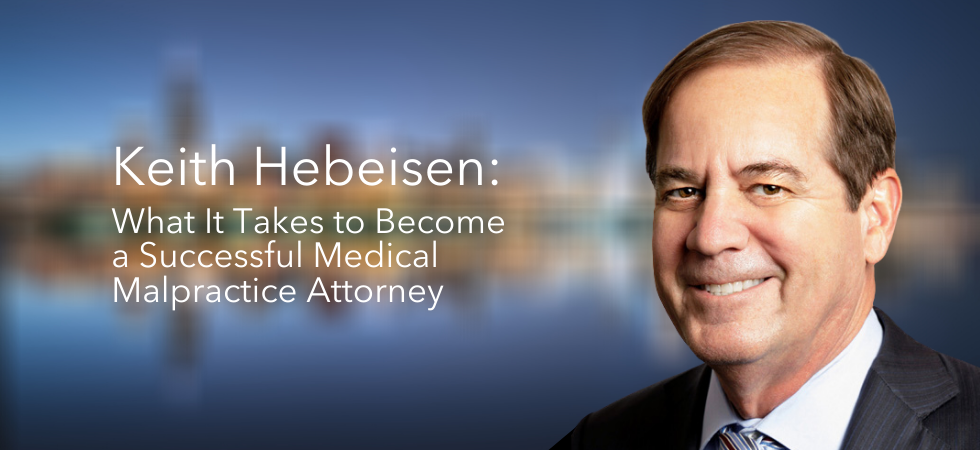When it comes to personal injury cases and representing clients, three words best sum up Keith Hebeisen’s approach: discipline, dedication, and depositions.
A partner at Clifford Law Offices, Keith joined the firm in 1984 and since that time has emerged as one of Chicago’s leading medical malpractice attorneys. But one doesn’t reach that level of respect and achievement without countless hours of work, from extensive interactions with his clients to years of reading and studying to become an expert in the many areas of medical malpractice.
While he does handle claims in other areas of personal injury law, including transportation and product liability, Keith’s main focus is on medical malpractice cases. He was attracted to that area of personal injury law early on because medical malpractice cases are, in his own words, “so much more complex” than other areas of civil litigation. The stakes tend to be much higher, both in terms of the harm done to the victim and the compensation they seek, which enhances both the risks and the rewards of handling a medical malpractice case.
Preparing for such a case requires an enormous amount of effort on Keith’s part from the very start. The medical malpractice umbrella encompasses a wide range of complex topics that require not just knowledge but also the ability to turn that knowledge into compelling information to present in a courtroom setting. For example, it isn’t enough for Keith to simply understand how a doctor performs a C-section; he must understand every minute detail of the process in order to ask intelligent questions to witnesses — sometimes spontaneously and unrehearsed — and present information to a jury.
“I strive to be at least as knowledgeable if not more knowledgeable than the medical person being questioned,” he says.
For Keith, that means hours upon hours of preparation before he ever sets foot in a courtroom or before a settlement is reached. For the typical case, he might prepare over a period of months for the deposition of a healthcare professional by reading medical literature, being fully familiar with the client’s medical records, and working with experts in the field to gain a deeper understanding of the topic at hand.
Medical malpractice cases are typically settled based upon witnesses’ sworn out-of-court testimony, otherwise known as depositions. Keith says it’s common for him to spend the better part of two days preparing for medical malpractice deposition—this after months of gathering information and learning the relevant health care issues.
“For a three-hour deposition you might spend as much as 24 hours preparing for it,” he says, adding that “the time commitment to do it right is huge.”
This thoroughness isn’t for its own sake. Keith believes in the cases he takes on and sees it as both his job and duty to help another human being who is the victim of medical harm and negligence. And there are plenty of such cases today: a now-famous study from Johns Hopkins suggests that there are over 250,000 deaths each year in the U.S. because of medical errors. Holding the medical community accountable for its actions and upholding the physician duty of care is paramount to bringing that number down. Verdicts for patients in medical malpractice cases can help, but only when the attorney is persistent, detail-oriented, and willing to spend years fighting for another human being.
This is where Keith’s true motivation lies.
“There’s nothing more satisfying to me than spending several years getting to know my client and doing all the work it takes to get a case ready,” he says, adding that it is “their only chance for success in the courtroom.”
When asked what the key to that courtroom success is, he offers another three words: detail, detail, detail.
“What might seem small often makes a huge difference.”

